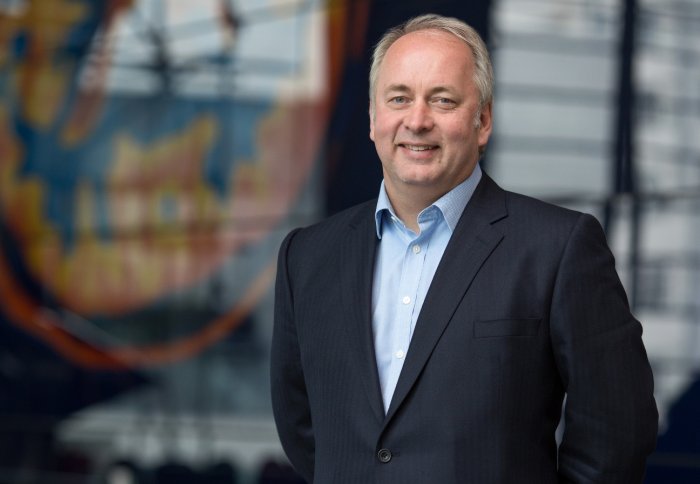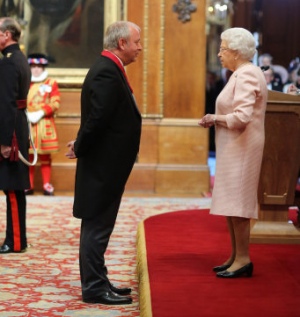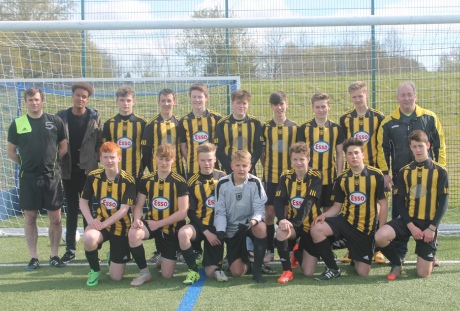Getting to know Professor Nick Jennings, Imperial's Vice-Provost for Research

From advising government on security through to coaching youth football, Nick Jennings brings a wealth of leadership experience to his new office.
As one of the UK’s leading computer scientists, Professor Nick Jennings’ research has encompassed a dizzying array of different applications – including environmental monitoring of the Briksdalsbreen glacier in Norway; controlling engine manufacturing lines at Daimler-Chrysler; interpretation of seismic data for oil exploration; and wind prediction for the British Olympic sailing team.
It’s not often you get a chance to be involved in shaping research and innovation on such a grand scale
– Professor Nick Jennings
While he won’t be drawn on favourites, he says the glacial work was very special – and in the end quite bittersweet.
“It was just very unusual. A colleague of mine was married to a glaciologist who really wanted to be able to measure inside the glacier. We thought that as a team we might just be able to build a sensor network to do that.
“We gathered some great data; but rather tellingly, our sensors lasted longer than the glacier as it receded and melted due to global warming.”
It’s this background in multi-disciplinary, collaborative work that Nick believes will stand him in good stead for his new role as Vice-Provost (Research) at Imperial.
When I meet Nick he’s sandwiched between a fact-finding tour of Imperial’s medical campuses (having already crossed off St Mary’s and Charing Cross) – acknowledging that medical and biological sciences are probably furthest from his own area of expertise.
Luckily though, he will get a little help from home in this regard.
“My wife is a molecular biologist – which does help when I get back from work and have to ask – ‘so what’s one of those then?’.”

A family vacation in Peru
The couple met as undergraduates at the University of Exeter then both came to London for PhDs – Nick at Queen Mary University and wife Jo at Imperial. Hence Nick is no stranger to the capital having spent 10 years here, from PhD, through postdoc, to Professor and Chair at the precocious age of 31. From there it was onto the University of Southampton with roles as Associate Dean for Research and Enterprise at the Faculty of Engineering and Head of the Electronics and Computer Science Department.
Grand challenges

Nick receives his CB
There are numerous other accolades on Nick’s CV, including the granting of a Regius Professorship and a Crown Honour in the form of a Companion of The Order of the Bath (CB).
But the one that really catches my eye is Nick’s six year term as Chief Scientific Advisor for National Security to the UK Government.
After we exchange some obligatory jokes about my lack of security clearance, Nick is happy to talk about aspects of the work.
“I really enjoyed seeing how government works from the inside; it was quite fascinating. The remit was very broad – aspects that one generally associates with security such as big data analysis and cyber security, but also around behavioural science; understanding why people act as they do. And of course things that ‘go bang’ at the other end. So the full spectrum really.
“I was the inaugural post-holder and so there was quite a lot of relatively simple and obvious things that could be done that made a huge difference. I was able to look back at what the state and use of science for national security was like when I arrived and by the time I left and there was a gratifying improvement. I think that’s largely because there hadn’t been that focus and senior leadership around science – there’d been lots of scientists working away in the national security space in various different labs but not the bringing together and senior advocacy at board level.”
That role took Nick on location to some eventful and interesting places including Afghanistan, Pakistan, Uganda and Kenya. A far cry from South Kensington and Exhibition Road – but Nick is delighted with his new base.
“Of course Imperial is a fantastic place with a stellar reputation, but I also thought that there was a lot of opportunity here; I was really attracted by the prospect of the White City Campus development – it’s not often you get a chance to be involved in shaping research and innovation on such a grand scale.”
It’s been exciting to see my research used in the real world – now I’m excited about helping more researchers get their technology and research utilised
– Professor Nick Jennings
Undoubtedly though, there remain challenges ahead for research intensive universities in maintaining research excellence. Nick’s primary role is in developing and spearheading Imperial’s research strategy, and enhancing the quality, impact, management and delivery of research in the College. While he acknowledges the great multidisciplinary research already taking place at Imperial, Nick says more could still be done to get the respective Faculties working together more closely. He is also keen to make more of Imperial’s Global Challenge Institutes.
“I want to give them the fire-power to get on and be that shop window for Imperial and the impactful work we are doing in trying to tackle those big challenges.”
Perhaps one of the biggest challenges on the near horizon though could be the potential consequences of Britain leaving the European Union after the upcoming referendum.
“The connections that we have in Europe are extremely important – our use of European funds, our ability to collaborate with other partner institutions and the free movement of talented people. Anything that makes those things harder will be difficult for any university to navigate.”
Nick is also in a rather unique place to comment not only as a leading collaborative researcher but also as a government insider on matters of security.
“The idea we can just put up very high walls, and not collaborate and not share information around Europe is misplaced – we need to share information where appropriate and that’s what makes us truly secure.”
Seizing opportunities
Through his career in academia, Nick has helped create two software start-ups in variab.ly, which provides negotiating algorithms for e-commerce marketplaces, and Aerogility, a decision support suite that optimises scheduling and maintenance for fleets of aircraft. The latter has been used by some of the world’s biggest defence manufacturers for some of the world’s most advanced aircraft, including BAE Systems’ Typhoon fleet and Lockheed Martin’s F-22 Raptor and F-35 fleets.
“It’s been exciting to see my research used in the real world – and now in this role I’m excited about doing what I can to open up the possibilities for as many researchers as possible to get their technology and research utilised. There is a noticeable change in academia, and perhaps society at large, where many more people are happy to do their own thing. That certainly applies to students as well; when I was an undergraduate no one was really that entrepreneurial, whereas now we have students doing competitions like hackathons and crowdfunding ideas themselves.”
Indeed Nick has long been involved in activities to help broaden the horizons and opportunities for young people. He has led successful teams of staff and students to take part in international competitions of artificial intelligence at home and abroad – winning titles at the Iterated Prisoners' Dilemma (2004 and 2005), RoboCup Rescue (2007) and the US Department of State's TAG Challenge (2012).
Meanwhile, away from intellectual pursuits Nick is a keen football fan and West Ham United F.C. supporter – “it’s been a good year all in all and I’m looking forward to the move to our new stadium at the Olympic Park”. He has also served as coach for a youth football team for the past ten years.
“I’ve steered them from under-six all the way through to under-16, and we’ve been on quite a journey, but this is my final year now.”
As he moves on to team building of a rather different kind at Imperial, it’s clear that Nick will make his presence felt in numerous facets of College life.

Nick (second row, far right) with team
Article text (excluding photos or graphics) © Imperial College London.
Photos and graphics subject to third party copyright used with permission or © Imperial College London.
Reporter
Andrew Czyzewski
Communications Division